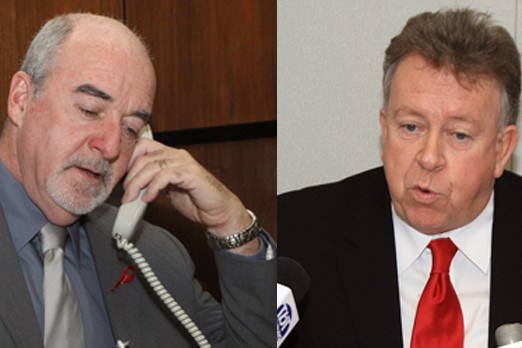Many residents say the mayor’s comments about the Minister of Northern Development and Mines not fighting hard enough for Thunder Bay won’t harm the city’s relationship with the province.
Mayor Keith Hobbs complained last week that MPP Michael Gravelle (Lib., Thunder Bay – Superior North), who is also Ontario’s mines minister, wasn’t’ fighting hard enough for the riding he represents when it comes to the Ring of Fire development.
Gravelle, during a news conference a day later, said he understood why Hobbs felt he had to go public with his complaints. Gravelle told media that the province is committed to bringing Ring of Fire development to Northern Ontario, but stated as minister he can’t be seen to be lobbying for any particular community or riding.
Most residents who spoke to tbnewswatch.com on the weekend agreed that Hobbs and Gravelle were doing their jobs and that the exchange between the two politicians wouldn’t do any harm the city’s relationship with the province.
Katie Heikkinen, a regional co-ordinator with Ontario Telemedicine Network, said both Hobbs and Gravelle possess a lot of skills, know their business, and were simply doing their jobs.
"Mayor Hobbs has a responsibility to advocate for the city and what’s best for the community," Heikkinen said on Saturday. "As well, MPP Michael Gravelle has a responsibility as a minister to advocate for the North.
“I think one has to look at it with a specific municipal focus and the other has to look at it with a global, region-wide focus."
She said it was important that development from the Ring of Fire took place in the city to help curb the recent job loss.
While it is important to encourage white-collar jobs, such as research and innovation, employment involved with natural resources should be the main focus for both the city and the province, she added.
Randy Wilkie, a geology teacher at Lakehead University, said he saw Gravelle’s point of view by not lobbying for one particular community over another because he has to do what’s best for the province.
Wilkie said Thunder Bay has a number of advantages over other potential communities for the proposed smelter, which could help to make the city the attractive location.
"(The harbour) is a huge advantage," Wilkie said. "We got the port here and it is going to be needed to move that material out. It is always cheaper by ship."
Sean Patterson, a plasma assistant with Canadian Blood Services, said he didn’t think the comments between the two would cause any strain, but added that he believed it wouldn’t do any good. He said he hoped Hobbs wasn’t expecting favouritism from the minister.
"I hope he is just advocating for his city," Patterson said. "It’s sort of the mayor’s job to demand those kinds of things. But if there is an expectation of receiving it then it is a little bit worrisome. There is no harm in asking."
The entire region must be given the opportunity to build its own case, for the smelter, which Cleveland-based mining company Cliff’s Natural Resources has said it plans to build to refine the estimated 1 million to 2 million tonnes of chromite the open pit mining operation is expected to yield annually.
The chromite will be processed and produce between 400,000 and 800,000 tonnes of ferrochrome, used in the production of stainless steel, an operation expected to be worth up to $30 billion or more over the Ring of Fire’s lifespan.
There are no guarantees that any of the processing work will take place in Ontario, and high energy costs could drive the work to Manitoba, Quebec or even British Columbia.
Hobbs said he’s always had a good relationship with Gravelle, but as mayor he has to do what’s best for his community.
Cliff’s is expected to release in the next few weeks a shortlist of Ontario communities it is considering for the processor, should it be built in the province.
Thunder Bay, Sault Ste. Marie, Timmins, Sudbury Greenstone and many other communities in Northwestern and Northeastern Ontario have all expressed an interest in housing the plant.
Sign in or register
- Messages
- Post a Listing
- Your Listings
- Your Profile
- Your Subscriptions
- Your Likes
- Your Business
- Support Local News
- Payment History
Registered Users
Already have an account?
New Users
Create a free account.
